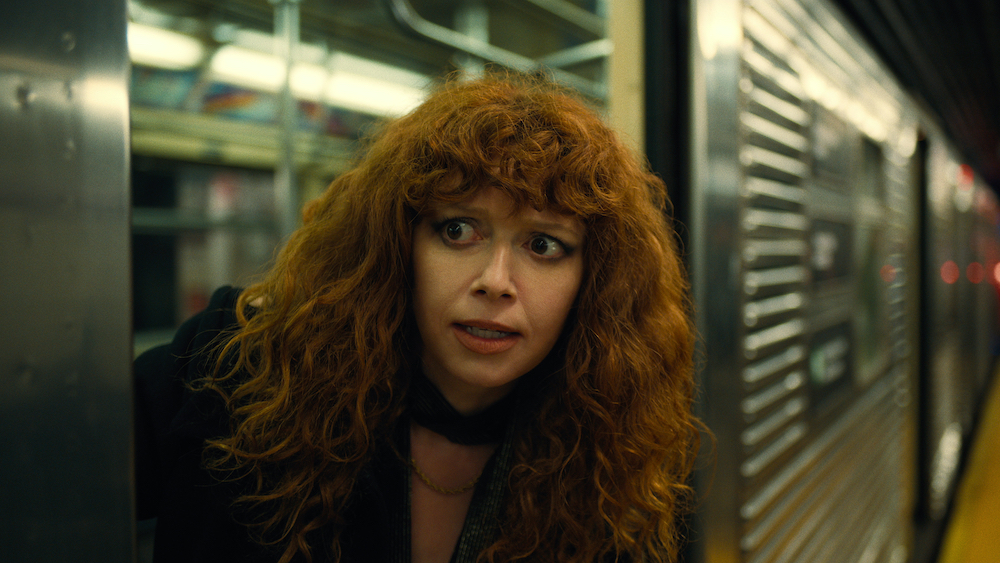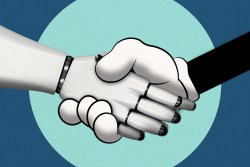SPOLER ALERT: Do not read if you have not yet watched “Matryoshka,” the Season 2 finale episode of “Russian Doll.”
In Season 2, “Russian Doll” broke out of its first season’s “Groundhog Day”-style time-loop format with a “Quantum Leap”-like time-travel device that allowed Nadia (Natasha Lyonne) and Alan (Charlie Barnett) to jump into the bodies of their deceased loved ones by taking a trip on the New York City subway. Nadia becomes her mother, Lenora “Nora” (Chloë Sevigny), in the East Village in 1982, and later grandmother Vera (Irén Bordán, younger version Ilona McCrea) in World War II-era Budapest, while Alan is inhabiting his grandmother Agnes (Carolyn Michelle Smith) in Germany during the Cold War in 1962.
The time travel allows them both to explore the pasts that had shaped them long before they were born. Nadia specifically makes multiple futile attempts to change the course of history for her mother and, therefore, herself, all while avoiding the present day, where her surrogate mother Ruth (Elizabeth Ashley) is dying and Nadia’s friends Maxine (Greta Lee) and Lizzy (Rebecca Henderson) are trying to keep her focused on that, in favor of a past where Young Ruth (Annie Murphy) is alive and well.
All of this culminates in Nadia giving birth to herself and taking the baby to the present to try to raise her better than Nadia was raised by Nora. That decision begins to rip apart the fabric of reality around Alan and Nadia, who dive further into the bowels of time and the MTA underworld — until Nadia finally brings Baby Nadia back to Nora and allows history to properly repeat itself.
Popular on Variety
Variety spoke with “Russian Doll” star, co-creator and showrunner Lyonne about all the twists in Season 2, and what she has in mind for a third season, should Netflix renew the show.

Having finished Season 2, in a simplified breakdown here, it seems Season 1 is focused on the present, Season 2 is focused on the past — does that mean you’d be looking into the future for a potential Season 3?
Without saying too much, that thought has occurred to me, as well. The show is always going to be a philosophical, psychedelic meditation on the nature of time, mortality and so on. Yes, one of the jumping off points of Season 2 is this Italian physicist Carlo Rovelli and this idea about the arrow of time and asking the question, why can I remember the past, but I can’t remember the future? That opens up some big questions. And who knows? Who knows if they’ll ever let me do this again?
Intergenerational trauma is a big theme in Season 2, explored in a very literal way thanks to the body-swapping element. What were you trying to say with this version of time travel, versus a more traditional way of approaching that plot device?
I always find it incredibly frustrating that in therapy, you cannot escape your family of origin. And try as you might to be like, “No, really, this boyfriend is different. My questions about this boyfriend are just in the here and now. I don’t like his chewing. It’s not about my mother or father, doctor.” And yet here we are, and it is.
I remember Allison Silverman bringing Octavia Butler’s “Kindred” into the room as a female lens of time travel. Of course, we all love “Back to the Future,” but are there other ways to see time? And when we talk about block universe, which is, to my limited-high-school-dropout understanding, this idea that moments in time are conceivably happening at the same time, but we lack the ability to see them. So I wonder from a PTSD standpoint, if the trigger points of this epigenetic trauma is not something that has us time-traveling in our present, mundane moments more than we actually realize. Yeah, all those character based explorations, despite very specific character work and using a lot of like personal specifics to get there, those are the bigger questions that I’m after.

Nadia very clearly is not concerned about casually revealing who she really is to people when she’s in Nora’s body, who don’t actually listen to her or believe her, and is actively trying to change things, but Alan is very, very careful about not wanting to disrupt past events while inhabiting his grandmother’s body. When it comes to the rules of time traveling, how did you decide what Nadia and Alan’s behavior would be like?
In the most simplified version, Season 1 is “Groundhog Day” and Season 2 is “Quantum Leap.” We’ve all seen this, so there is a shorthand with the audience. As a New Yorker, there’s a shorthand with the pals who are only half-listening and really just want to know if you’re going to make it to dinner or not. Or in Maxine’s case and Lizzy’s case, regardless of what wormholes you’re finding, you’re not showing up for Ruth, who is your real godmother who really needs a caretaker right now. And Nadia is like, “Hey, Annie Murphy is back there in the ’80s, so I got to get back.” Nadia has this weirdly specific skill of being a coder and working in this video game design space where she understands the rules of play easier than the next person. You see that a lot in Season 1 when she’s cutting the orange and explaining the nature of time and experience and what’s going on. Similarly in Season 2, the jump is that Nadia can integrate an experience and use it to her own purposes pretty quickly. Oftentimes, you see these characters who aren’t supposed to know the rules of other states of play. But she’s like, “No, I’ve seen movies.” And I do like the idea that Alan and Nadia are opposite sides of a spectrum in their approach to the rules of time travel.
Where did the idea come from for the Nadia-as-Nora-giving-birth-to-Nadia scene?
Obviously, this show is trying to have a bit of a sense of humor. As a person, I’ve spent a lot of years going into very dark places and you do a lot of work to get out. And they talk about this idea of re-parenting and loving the inner child. I just think that’s so funny, the idea of an inner child made tangible. It makes you laugh. Because you do so much therapeutic work to be a high-functioning person. I love that idea that she’s really curious about free will on the most instinctual, guttural level of, “OK, well, let’s do this.” At various points in the room, that was actually a 13-year-old rebellious tween Nadia, who is a ’90s kid into Nirvana and being a troublemaker. But it became, if you introduce a gun in Act One, you’ve got to fire it — and that was Nora’s baby. Where’s that scene? It’s got to be in it. There were so many different ideas. Baby Nadia and Teen Nadia walking around with a Beta Alan. There was a babysitting episode where it was Teen Nadia had to get around the city with a “Child’s Play”-like version of Little Nadia, who was just giving her a really hard time. There’s a lot of things that got left on the floor, but it did feel like, what would be the most immediate version of re-parenting? Take the baby.

Nadia struggles with Ruth slowly dying in the present day throughout the season, and due to her focus on changing the past, she misses Ruth’s death. She did get to say goodbye to Young Ruth in the past, but as Nadia herself, and so she just looked at her like she was crazy. Why was it important Nadia not be able to say goodbye to her Ruth, and would we see that in a Season 3?
It’s the idea that, as we get older, we’re expected to become the caretaker. But it doesn’t mean that we’re adult enough to do it yet. So part of Nadia’s journey this year is Ruth, the thing that she can’t handle in the present. She thinks she’s getting a free pass by heading into the past, and who wouldn’t want to hang out with Annie Murphy? She’s sort of the heart of the season. And she has such unconditional love in that intergenerational female friendship. The same as Vera and Delia (Athina Papadimitriu) are making it through the war. And Ruth and Nora getting through this non-judgmental version of female friendship. And down to Nadia and Maxine. I love the chosen sisterhoods.
But Nadia gets to go hang out with Annie Murphy, and she’s like, “Oh, cool, now I’m with Ruth. I’m showing up, even though I don’t actually have to be in the hospital, which I don’t have the emotional maturity to do.” But of course, nothing in life is that easy. So you’re either going to go willingly or you’ll be dragged kicking and screaming. It was important that, in a weird way, by Nadia not being able to get exactly what she wants by way of closure with Ruth, this other deeper thing happens, which is Ruth doesn’t hold that against Nadia. The idea of true unconditional love in a life is also this idea that, I forgive you your shortcomings as a person. Ruth knows Nadia well enough to know, in her own way, she is showing up. Since you’ve been breaking Season 3, it’s worth noting that maybe she will get to say goodbye.

So where are you at with ideas for Season 3, and do you foresee that as being a final season?
First of all, I’m so excited that you’ve been greenlighting the third season this entire interview. I’m really grateful and we’ll tell Netflix and we’re all so excited to hear the news from you: It feels like there’s an idea cooking for Season 3. And it would be really fun if it was one of those shows where, five years later, it’s like, “No, wait a second! I think we’ve got another idea for a few episodes.” I would love to see that for “Russian Doll.” “Oh, wait, I think we’ve got an idea of our original movie now. It’s been 20 years later.” I don’t think I’ll ever be done with this show. It depends a lot about appetite and reception.
This interview has been edited and condensed.











